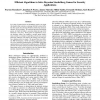Free Online Productivity Tools
i2Speak
i2Symbol
i2OCR
iTex2Img
iWeb2Print
iWeb2Shot
i2Type
iPdf2Split
iPdf2Merge
i2Bopomofo
i2Arabic
i2Style
i2Image
i2PDF
iLatex2Rtf
Sci2ools
125
click to vote
AAAI
2008
2008
Efficient Algorithms to Solve Bayesian Stackelberg Games for Security Applications
In a class of games known as Stackelberg games, one agent (the leader) must commit to a strategy that can be observed by the other agent (the adversary/follower) before the adversary chooses its own strategy. We consider Bayesian Stackelberg games, in which the leader is uncertain about the type of the adversary it may face. Such games are important in security domains, where, for example, a security agent (leader) must commit to a strategy of patrolling certain areas, and an adversary (follower) can observe this strategy over time before choosing where to attack. We present here two different MIP-formulations, ASAP (providing approximate policies with controlled randomization) and DOBSS (providing optimal policies) for Bayesian Stackelberg games. DOBSS is currently the fastest optimal procedure for Bayesian Stackelberg games and is in use by police at the Los Angeles International Airport(LAX) to schedule their activities.
Related Content
| Added | 02 Oct 2010 |
| Updated | 02 Oct 2010 |
| Type | Conference |
| Year | 2008 |
| Where | AAAI |
| Authors | Praveen Paruchuri, Jonathan P. Pearce, Janusz Marecki, Milind Tambe, Fernando Ordóñez, Sarit Kraus |
Comments (0)

